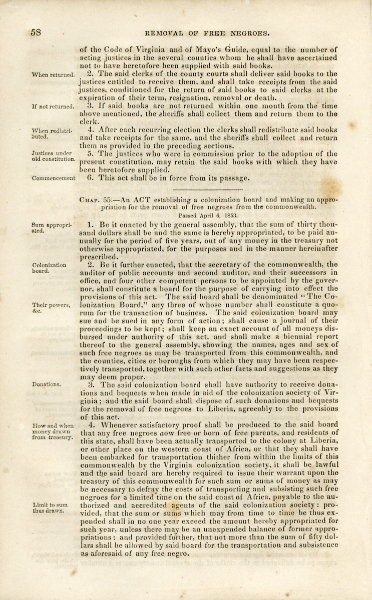
The American Colonization Society was founded in 1817 to promote the voluntary return of free African Americans in the United States to Africa. In 1822, the Society founded a colony on the west coast of Africa that would become the independent nation of Liberia in 1847. In total, over 3,700 Virginians left for Africa between 1820 and 1865. Many emigrated voluntary, hoping to create better lives for themselves and their families in a colony where they could live as free citizens with full rights; others left only as a requirement of their emancipation. Such was the case with the enslaved persons owned by Elizabeth Gordon of Orange County. In her will, recorded on 22 November 1852, she freed her slaves with instructions that they be sent to Liberia with assistance from Rev. John Royal, who worked with the Virginia Colonization Society.
The General Assembly created the Virginia Colonization Board in April 1853, replacing several earlier incarnations of the Board, in order to help fund the transportation, removal, and settlement of Virginia free persons of color to Liberia. The Virginia Colonization Society, a branch of the American Colonization Society, arranged for the actual passage to Africa and presented the required affidavits to the Colonization Board, proving that individuals were free as of 6 April 1853 and were residents of the state. The Colonization Board reimbursed the Virginia Colonization Society for transportation costs through its agent, Rev. Philip Slaughter, after satisfactory proof that the freed men and women had been transported out of state.
The Journal of Proceedings of the Virginia Colonization Board documents the actions of the Board and includes minutes, rules, regulations, and resolutions of the Board, as well as the amounts of monies disbursed for transportation. More importantly, however, it contains the names of 395 men, women, and children who emigrated to Liberia. The lists of emigrants include the names and ages of those transported from the Commonwealth to Liberia between 1853 and 1858, as well as the county, city, or borough from which they were transported. Some entries also include information on the method of emancipation or manumission. The slaves emancipated by Elizabeth Gordon can be found in the proceedings recorded on 2 May 1853, and an additional look at the inventory filed in Orange County court reveals some of the family relationships between these 34 individuals. Interest in emigration began to wane through the 1850s, and the Virginia Colonization Board held its last meeting on 14 August 1858, after the preceding session of the General Assembly failed to extend its existence.
The Journal of Proceedings of the Virginia Colonization Board has been scanned and indexed and is now available as part of Virginia Untold: The African American Narrative. Their first annual report to the General Assembly is also available via HathiTrust.
-Paige Neal, State Records Archivist















